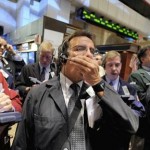Did Wall Street Dodge a Bullet?
 While political blogs have been debating and scrutinizing the recently passed financial regulation bill, a scan of blogs from the financial world suggests that many on Wall Street are still holding their breath before declaring their verdict.
While political blogs have been debating and scrutinizing the recently passed financial regulation bill, a scan of blogs from the financial world suggests that many on Wall Street are still holding their breath before declaring their verdict.
While political blogs have been debating and scrutinizing the recently passed financial regulation bill, a scan of blogs from the financial world suggest that many on Wall Street are holding their breath before declaring their verdict.
From the world of political journalism, James Pethokoukis argues that Wall Street managed to avoid the imposition of truly tough regulations in the final version of the bill:
The bill just kept getting tougher as the talk dragged on. But it could have been worse. While banks’ future activities and profitability may get pinched, their core business model appears intact. In the end, Wall Street got nicked, not nuked.
Noam Schieber also stressed that the bill was not going to be the sweeping legislation that some of its advocates wanted:
Does the financial reform bill really solve the problem of “too big to fail”? The answer is: “Sorta,” but not quite in the way the bill’s supporters suggest.
Some commentators were actually very positive. With Edmund L. Andrews authoring a largely positive assessment of the bill entitled “Holy Cow! We're going to have financial reform.”
Commentary from the actual Wall Street blogs has been much more cynical. One popular blog post, which has been cross-posted at seekingalpha.com is entitled: “The Senate’s Faux Financial Reform Bill”. The anonymous author “George Washington” is not happy with the legislation since he does not think it is strict enough:
The Senate passed a financial "reform" bill Thursday by a 59-39 vote which won't fix any of the core problems in the financial system, and won't prevent the next financial crisis.
The bill doesn't include the Volcker Rule (it wasn't even debated), doesn't break up or even substantially rein in the too big to fails, and doesn't force transparency in the derivatives market.
After citing various Senators and academics who think the bill is too weak, Washington concludes:
The bill is all holes and no cheese.
Skepticism is the rule of the day on other posts. In a post from before the passing of the bill, Mike Konczal laments if anything is truly being achieved in the reform:
Instead of real reform, I worry we are going to get to wear a T-Shirt that says: 'Taxpayers gave TARP, GSEs, TALF, AMLF, Maiden Lanes, ring fenced half a trillion dollars worth of debt in off-balance sheets, TLGP, TSLF, double-digit unemployment etc. and all we got was a consumer hotline to the basement of the Fed.'
Other blogs noted that the bill had passed, but provided little commentary of their own. The popular Wall Street tabloid Dealbreaker, simply included a short critical comment from the U.S. Chamber of Commerce.
While political journalists are understandably focused on the bill, Wall Street’s attitude seems to be more skeptical about the prospect. This might be because they would prefer to spend their energy focusing on where the next deal might be found, as opposed to commenting on legislation. This might explain why some investment blogs are focusing their time and energy on whether Australia’s banks are about to collapse.